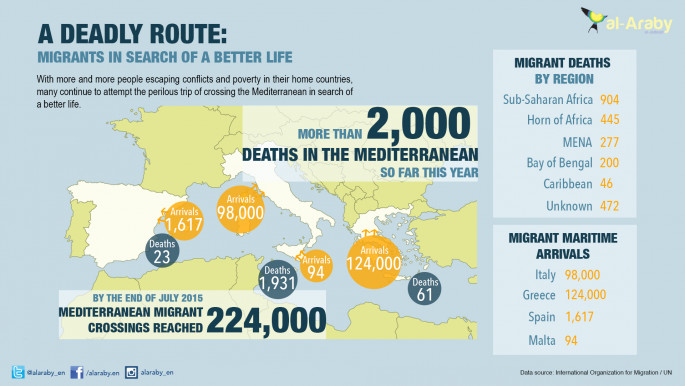Nightmare at sea: Coffins brought back into Italy
Survivors of a shipwreck off the coast of Libya, in which some 200 migrants were feared drowned, arrived in Sicily as the Irish crew that rescued them described how they battled to save lives.
Flower-topped coffins containing the bodies of the recovered dead were loaded into black funeral vans on Thursday.
Save the Children said three of those who died were "very young" children.
| It was a horrific sight, people desperately clinging to anything they could, fighting for their lives, amidst people drowning, and those who had already died |
The fishing boat, believed to have been carrying more than 600 people, ran into difficulty about 15 nautical miles off Libya on Wednesday and tipped over when rescuers neared, after frantic migrants rushed to one side in their desperation to be saved.
Irish patrol vessel Niamh, first on the scene of the disaster, arrived in Palermo with 367 survivors, including 12 women and 13 children, as well as 25 bodies recovered.
It is feared over 100 people were trapped in the hull and went down with the boat.
The ongoing search and recovery efforts did not turn up any additional survivors or the bodies of victims, the Italian coast guard said.
Red Cross workers handed out water and shoes to disembarking survivors, who were believed to hail from Sub-Saharan Africa, Syria and the Indian subcontinent. Tents on the portside provided shade from the blazing sun and privacy for health checks.
It is not the first time a boat making the perilous journey across the Mediterranean has overturned because of sudden movement onboard when help is in sight.
Many migrants cannot swim, making it a race against time for rescue workers trying to pull them from the water.
Commander Ken Minihane said his crew had done everything to try and save a child plucked from the sea, but could not revive him.
"It was very upsetting to see a mother and father grieving for their young child, and our personnel tried to resuscitate him but unfortunately there was nothing they could do," he told journalists at the portside.
Earlier, Juan Matias, a project coordinator for Doctors Without Borders (MSF), described the nightmare he witnessed out at sea.
"It was a horrific sight, people desperately clinging to lifebelts, boats and anything they could, fighting for their lives, amidst people drowning, and those who had already died," he said.
The MSF boat Dignity One was the second vessel on the scene and helped rescue panicking children and adults from the water. It was delayed, however, by being diverted en route to help another boat in trouble with 94 people aboard.
More than 1,130 migrants were rescued Thursday from four other vessels. during one of the operations more than 600 people, many panicking, were pulled from a boat that threatened to capsize at any moment.
 |
|
| A Deadly Route: Click here to enlarge image |
'Disappeared underwater'
"The fact that we were first called to assist this boat and then shortly afterwards sent to another one highlights the severe lack of resources available for rescue operations," Matias said.
More than 2,100 people have already died trying to cross the Mediterranean to Europe this year, according to the UN refugee agency UNHCR.
The government in Italy, one of the countries bearing the brunt of the crisis, has pleaded repeatedly for more resources to deal with the unremitting wave of boats from the coast of North Africa.
The deputy director of the European Borders Agency Frontex, Gil Arias-Fernandez told El Mundo daily that there was a shortage of resources to prevent disasters, because countries were reluctant to lend equipment.
"We have the necessary money but we don't have the ships, planes and border guards in which to invest the money. We are not getting an adequate response from the European members to meet our needs," he said.
The moment when the boat overturned and the migrants were tipped into the sea on Wednesday "was like being flung from a catapult," Mohamed, a Palestinian farmer, told MSF in a story recounted in the Italian daily Corriere della Sera.
His daughter Azeel "disappeared underwater. I could only see heads, all around, amid the waves, everyone pushing down on everyone else to try and stay afloat," he said.
"A wall between me and my daughter, while my wife was gasping for breath. And I dived under, ready to die to safe my daughter," he said, describing how he managed to rescue her - "I don't know how" - and pull his wife to a lifeboat as well.
Wednesday's disaster was the worst in the Mediterranean since 800 migrants were feared drowned off Libya in April.





 Follow the Middle East's top stories in English at The New Arab on Google News
Follow the Middle East's top stories in English at The New Arab on Google News
![Israeli forces ordered bombed Gaza's Jabalia, ordering residents to leave [Getty]](/sites/default/files/styles/image_330x185/public/2176418030.jpeg?h=a5f2f23a&itok=_YGZaP1z)

